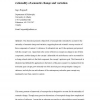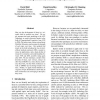396 search results - page 14 / 80 » How scientific models can explain |
SYNTHESE
2010
13 years 5 months ago
2010
: The discussion presents a framework of concepts that is intended to account for the rationality of semantic change and variation, suggesting that each scientific concept consists...
EDBTW
2006
Springer
13 years 11 months ago
2006
Springer
In my thesis I will address the problem of interoperation between information spaces on the web. We explain how this problem is different to traditional database integration scenar...
FCT
2005
Springer
14 years 1 months ago
2005
Springer
We review a recently introduced computation model for streaming and external memory data. An important feature of this model is that it distinguishes between sequentially reading (...
EMNLP
2008
13 years 9 months ago
2008
How can the development of ideas in a scientific field be studied over time? We apply unsupervised topic modeling to the ACL Anthology to analyze historical trends in the field of...
SPLC
2010
13 years 5 months ago
2010
Abstract. Feature modeling is a technique for capturing commonality and variability. Feature models symbolize a representation of the possible application configuration space, and ...


